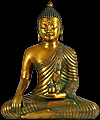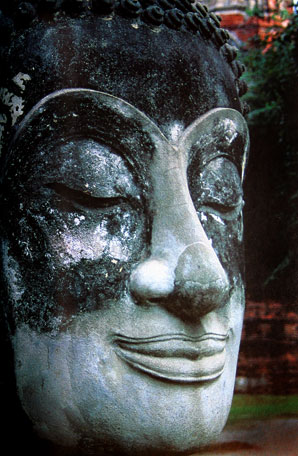Diamond SutraThe Vajracchedika Prajna paramita Sutra |
 |
|
|
"Subhuti, if on the one hand, a daughter or son of a good family gives up her or his life in the morning as many times as there are grains of sand in the Ganges as an act of generosity, and gives as many again in the afternoon and as many again in the evening, and continues doing so for countless ages; and if, on the other hand, another person listens to this sutra with complete confidence and without contention, that person's happiness will be far greater. But the happiness of one who writes this sutra down, receives, recites, and explains it to others cannot be compared.
"In summary, Subhuti, this sutra brings about boundless virtue and happiness that cannot be conceived or measured. If there is someone capable of receiving, practicing, reciting, and sharing this sutra with others, the Tathagata will see and know that person, and he or she will have inconceivable, indescribable, and incomparable virtue. Such a person will be able to shoulder the highest, most fulfilled, awakened career of the Tathagata. Why? Subhuti, if one is content with the small teachings, if he or she is still caught up in the idea of a self, a person, a living being, or a life span, he or she will not be able to listen, receive, recite, and explain this sutra to others. Subhuti, any place this sutra is found is a place where gods, men, and asuras will come to make offerings. Such a place is a shrine and should be venerated with formal ceremonies, circumambulations, and offerings of flowers and incense."
"Furthermore, Subhuti, if a son or daughter of good family, while reciting and practicing this sutra, is disdained or slandered, his or her misdeeds committed in past lives, including those that could bring about an evil destiny, will be eradicated, and he or she will attain the fruit of the most fulfilled, awakened mind. Subhuti, in ancient times before I met Buddha Dipankara, I had made offerings to and had been attendant of all 84,000 multi-millions of Buddhas. If someone is able to receive, recite, study, and practice this sutra in the last epoch, the happiness brought about by this virtuous act is hundreds of thousands times greater than that which I brought about in ancient times. In fact, such happiness cannot be conceived or compared with anything, even mathematically. Such happiness is immeasurable.
"Subhuti, the happiness resulting from the virtuous act of a son or daughter of good family who receives, recites, studies, and practices this sutra in the last epoch will be so great that if I were to explain it now in detail, some people would become suspicious and disbelieving, and their minds might become disoriented. Subhuti, you should know that the meaning of this sutra is beyond
conception and discussion. Likewise, the fruit resulting from receiving and practicing this sutra is beyond conception and discussion."
At that time, the Venerable Subhuti said to the Buddha, "World-Honored One, may I ask you again that if daughters or sons of good family want to give rise to the highest, most fulfilled, awakened mind, what should they rely on and what should they do to master their thinking?"
The Buddha replied, "Subhuti, a good son or daughter who wants to give rise to the highest, most fulfilled, awakened mind should do it in this way: 'We must lead all beings to the shore of awakening, but, after these beings have become liberated, we do not, in truth, think that a single being has been liberated.' Why is this so? Subhuti, if a bodhisattva is still caught up in the idea of
a self, a person, a living being or a life span, that person is not an authentic bodhisattva. Why is that?
"Subhuti, in fact, there is no independently existing object of mind called the highest, most fulfilled, awakened mind. What do you think, Subhuti? In ancient times, when the Tathagata was living with Buddha Dipankara, did he attain anything called the highest, most fulfilled, awakened mind?"
"No, World-Honored One. According to what I understand from the teachings of the Buddha, there is no attaining of anything called the highest, most fulfilled, awakened mind."
The Buddha said, "Right you are, Subhuti. In fact, there does not exist the so-called highest, most fulfilled, awakened mind that the Tathagata attains. Because if there had been any such thing, Buddha Dipankara would not have predicted of me, 'In the future, you will come to be a Buddha called Shakyamuni.' This prediction was made because there is, in fact, nothing that can be attained that is called the highest, most fulfilled, awakened mind. Why? Tathagata means the such-ness of all things (dharmas). Someone would be mistaken to say that the Tathagata has attained the highest, most fulfilled, awakened mind since there is not any highest, most fulfilled, awakened mind to be attained. Subhuti, the highest, most fulfilled, awakened mind that the Tathágata has attained is neither graspable nor elusive. This is why the Tathágata has said, 'All dharmas are Buddha dharma.' What are called all dharmas are, in fact, not all dharmas. That is why they are called all dharmas.
"Subhuti, a comparison can be made with the idea of a great human body."
Subhuti said, "What the Tathagata calls a great human body is, in fact, not a great human body."
"Subhuti, it is the same concerning bodhisattvas. If a bodhisattva thinks that she has to liberate all living beings, then she is not yet a bodhisattva. Why? Subhuti, there is no independently existing object of mind called bodhisattva. Therefore, the Buddha has said that all dharmas are without a self, a person, a living being, or a life span. Subhuti, if a bodhisattva thinks, 'I have to
create a serene and beautiful Buddha field¹, that person is not yet a bodhisattva. Why? What the Tathagata calls a serene and beautiful Buddha field is not in fact a serene and beautiful Buddha field. And that is why it is called a serene and beautiful Buddha field. Subhuti, any bodhisattva who thoroughly understands the principle of non-self and non-dharma is called by the Tathagata
an authentic bodhisattva."
"Subhuti, what do you think? Does the Tathagata have the human eye?"
Subhuti replied, "Yes, World-Honored One, the Tathagata does have the human eye."
The Buddha asked, "Subhuti, what do you think? Does the Tathagata have the divine eye?"
Subhuti said, "Yes, World-Honored One, the Tathagata does have the divine eye."
"Subhuti, what do you think? Does the Tathagata have the eye of insight?"
Subhuti replied, "Yes, World-Honored One, the Tathagata does have the eye of insight."
"Subhuti, what do you think? Does the Tathagata have the eye of transcendent wisdom?"
"Yes, World-Honored One, the Tathagata does have the eye of transcendent wisdom."
The Buddha asked, "Does the Tathagata have the Buddha eye?"
"Yes, World-Honored One, the Tathagata does have the Buddha eye."
"Subhuti, what do you think? Does the Buddha see the sand in the Ganges as sand?"
Subhuti said, "World-Honored One, the Tathagata also calls it sand."
"Subhuti, if there were as many Ganges Rivers as the number of grains of sand of the Ganges and there was a Buddha land for each grain of sand in all those Ganges Rivers, would those Buddha lands be many?"
"Yes, World-Honored One, very many."
The Buddha said, "Subhuti, however many living beings there are in all these Buddha lands, though they each have a different mentality, the Tathagata understands them all. Why is that? Subhuti, what the Tathágata calls different mentalities are not in fact different mentalities. That is why they are called different mentalities."
"Why? Subhuti, the past mind cannot be grasped, neither can the present mind or the future mind."
"What do you think, Subhuti? If someone were to fill the 3,000 chiliocosms with precious treasures as an act of generosity, would that person bring great happiness by his virtuous act?" "Yes, very much, World-Honored One."
"Subhuti, if such happiness were conceived as an entity separate from everything else, the Tathagata would not have said it to be great, but because it is ungraspable, the Tathagata has said that the virtuous act of that person brought about great happiness."
"Subhuti, what do you think? Can the Tathagata be perceived by his perfectly formed body?"
"No, World-Honored One. What the Tathagata calls a perfectly formed body is not in fact a perfectly formed body. That is why it is called a perfectly formed body."
"What do you think, Subhuti? Can the Tathagata be perceived by his perfectly formed physiognomy?"
"No, World-Honored One. It is impossible to perceive the Tathagata by any perfectly formed physiognomy. Why? Because what the Tathagata calls perfectly formed physiognomy is not in fact perfectly formed physiognomy. That is why it is called perfectly formed physiognomy."
"Subhuti, do not say that the Tathagata conceives the idea 'I will give a teaching¹. Do not think that way. Why? If anyone says that the Tathagata has something to teach, that person slanders the Buddha because he does not understand what I say. Subhuti, giving a Dharma talk in fact means that no talk is given. This is truly a Dharma talk."
Then, Insight-Life Subhuti said to the Buddha, "World-Honored One, in the future, will there be living beings who will feel complete confidence when they hear these words?"
The Buddha said, "Subhuti, those living beings are neither living beings nor non-living beings. Why is that? Subhuti, what the Tathagata calls non-living beings are truly living beings."
Subhuti asked the Buddha, "World-Honored One, is the highest, most fulfilled, awakened mind that the Buddha attained the unattainable?"
The Buddha said, "That is right, Subhuti. Regarding the highest, most fulfilled, awakened mind, I have not attained anything. That is why it is called the highest, most fulfilled, awakened mind."
"Furthermore, Subhuti, that mind is everywhere equally. Because it is neither high nor low, it is called the highest, most fulfilled, awakened mind. The fruit of the highest, most fulfilled, awakened mind is realized through the practice of all wholesome actions in the spirit of non-self, non-person, non-living being, and non-life span. Subhuti, what are called wholesome actions are in fact not wholesome actions. That is why they are called wholesome actions."
"Subhuti, if someone were to fill the 3,000 chiliocosms with piles of the seven precious treasures as high as Mount Sumeru as an act of generosity, the happiness resulting from this is much less than that of another person who knows how to accept, practice, and explain the Vajracchedika Prajna paramita Sutra to others. The happiness resulting from the virtue of a person who practices this sutra, even if it is only a gatha of four lines, cannot be described by using examples or mathematics."
"Subhuti, do not say that the Tathágata has the idea, 'I will bring living beings to the shore of liberation.' Do not think that way, Subhuti. Why? In truth there is not one single being for the Tathágata to bring to the other shore. If the Tathágata were to think there was, he would be caught in the idea of a self, a person, a living being, or a life span. Subhuti, what the Tathágata
calls a self essentially has no self in the way that ordinary persons think there is a self. Subhuti, the
Tathágata does not regard anyone as an ordinary person. That is why he can call them ordinary persons."
"What do you think, Subhuti? Can someone meditate on the Tathagata by means of the thirty-two marks?"
Subhuti said, "Yes, World-Honored One. We should use the thirty-two marks to meditate on the Tathagata."
The Buddha said, "If you say that you can use the thirty-two marks to see the Tathágata, then the Cakravartin is also a Tathagata?"
Subhuti said, "World-Honored One, I understand your teaching. One should not use the thirty-two marks to meditate on the Tathagata."
Then the World-Honored One spoke this verse:
"Someone who looks for me in form or seeks me in sound
is on a mistaken path and cannot see the Tathagata."
"Subhuti, if you think that the Tathagata realizes the highest, most fulfilled, awakened mind and does not need to have all the marks, you are wrong. Subhuti, do not think in that way. Do not think that when one gives rise to the highest, most fulfilled, awakened mind, one needs to see all objects of mind as nonexistent, cut off from life. Please do not think in that way. One who gives
rise to the highest, most fulfilled, awakened mind does not contend that all objects of mind are nonexistent and cut off from life."
"Subhuti, if a bodhisattva were to fill the 3,000 chiliocosms with the seven precious treasures, as many as the number of sand grains in the Ganges as an act of generosity, the happiness brought about by his or her virtue is less than that brought about by someone who has understood and wholeheartedly accepted the truth that all dharmas are of selfless nature and is able to live and bear fully this truth. Why is that, Subhuti? Because a bodhisattva does not need to build up virtue and happiness."
Subhuti asked the Buddha, "What do you mean, World-Honored One, when you say that a bodhisattva does not need to build up virtue and happiness?"
"Subhuti, a bodhisattva gives rise to virtue but is not caught in the idea of virtue and happiness. That is why the Tathagata has said that a bodhisattva does not need to build up virtue and happiness.”
"Subhuti, if someone says that the World-Honored One comes, goes, sits, and lies down, that person has not understood what I have said. Why? The meaning of Tathagata is 'does not come from anywhere and does not go anywhere¹. That is why he is called a Tathagata.
"Subhuti, if a daughter or son of a good family were to grind the 3,000 chiliocosms to particles of dust, do you think there would be many particles?"
Subhuti replied, "World-Honored One, there would be many indeed. Why? If particles of dust had a real self-existence, the Buddha would not have called them particles of dust. What the Buddha calls particles of dust are not, in essence, particles of dust. That is why they can be called particles of dust. World-Honored One, what the Tathagata calls the 3,000 chiliocosms are not chiliocosms. That is why they are called chiliocosms. Why? If chiliocosms are real, they are a compound of particles under the conditions of being assembled into an object. That which the Tathagata calls a compound is not essentially a compound. That is why it is called a compound."
"Subhuti, what is called a compound is just a conventional way of speaking. It has no real basis. Only ordinary people are caught up in conventional terms."
"Subhuti, if anyone says that the Buddha has spoken of a self view, a person view, a living-being view, or a life span view, has that person understood my meaning?"
"No, World-Honored One. Such a person has not understood the Tathagata. Why? What the Tathágata calls a self view, a person view, a living-being view, or a life span view are not in essence a self view, a person view, a living-being view, or a life span view. That is why they are called a self view, a person view, a living-being view, or a life span view."
"Subhuti, someone who gives rise to the highest, most fulfilled, awakened mind should know that this is true of all dharmas, should see that all dharmas are like this, should have confidence in the understanding of all dharmas without any conceptions about dharmas. Subhuti, what is called a conception of dharmas, the Tathagata has said, is not a conception of dharmas. That is why it is called a conception of dharmas."
|
"Subhuti, if someone were to offer an immeasurable quantity of the seven treasures to fill the worlds as infinite as space as an act of generosity, the happiness resulting from that virtuous act would not equal the happiness resulting from a son or daughter of a good family who gives rise to the awakened mind and reads, recites, accepts, and puts into practice this sutra, and
explains it to others, even if only a gatha of four lines. In what spirit is this explanation given? Without being caught up in signs, just according to things as they are, without agitation. Why is this? |


